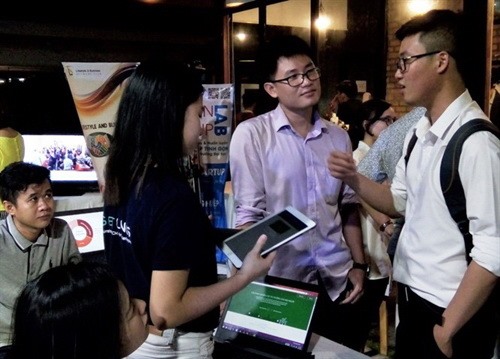HCM City has created many programmes to support start-up activities, and has plans to expand its support to individuals and groups with poential, the Sai Gon Hi-tech Park Incubation Centre (SHTP-IC) has said.

HCM City has created many programmes to support start-up activities, and has plans to expand its support to individuals and groups with poential, the Sai Gon Hi-tech Park Incubation Centre (SHTP-IC) has said.
Since 2014, the centre has incubated 38 projects, 22 of which have been commercialised, according to SHTP-IC. Last year total revenue from incubated projects reached VND41.4 billion (US$1.8 million), the centre said.
The centre also helps businesses and projects register for intellectual property rights, conduct market research, improve model products to take to trade fairs, and connect entrepreneurs with investors, capital plans and venture capital funds.
Le Thanh Nguyen, head of SHTP-IC, said this was a positive sign for a public incubation model for science-technology businesses.
Last year, the city’s Department of Science and Technology kicked off a pilot programme for the incubation of science-technology businesses at HCM City-based Nong Lam University, HCM City University of Technology and Sai Gon Hi-tech Park.
The department also provided consultation and added technological services for the businesses.
In addition, a number of universities in the city have also established start-up support centres for their own students.
Other private incubation centres have also been built such as Software Business Incubator (SBI) and FPT Ventures.
Thanks to the diversity of incubation centres, start-ups can now easily find support, investment and partners, according to the centre.
Challenges
Most of Viet Nam’s start-ups, however, are small in scale and yet to enter the capital-calling period, according to the Department of Science and Technology.
They need support from the government and participation in public-private cooperation models, as well as contributions from part of the innovative start-up ecosystem.
In addition, they are not lucrative enough to attract investors because of specific features and policies of public incubation centres.
Tran Van Tung, deputy minister of the Ministry of Science and Technology, said the biggest weakness were start-up skills. A successful start-up business must bring its products to the market, he said.
“In addition, mobilising capital from investors is very important. If start-ups cannot attract capital, they will not have enough resources to grow,” he said.
Experts said the city would focus on encouraging innovative startup activities among young people and high school students due to their great potential.
Nguyen Viet Dung, director of the Department of Science and Technology, said it was necessary to help individuals and businesses conduct research and reform their operations.
Speaking at a recent meeting held in Ha Noi, Vu Tien Loc, chairman of the Viet Nam Chamber of Commerce and Industry (VCCI), said more than 50 investment funds in diverse investment forms existed, but they were scattered and on a small scale.
To foster start-up activities, the city has introduced many policies, including a programme to help small- and medium-sized businesses to innovate and increase global competitiveness in the 2016-2020 period.
HCM City has set a goal to support 2,000 innovative businesses until 2020 by creating an innovative working environment for startups via public-private cooperation.
Viet Nam currently has 1,800 start-ups, of which 834 operate in HCM City.
Despite strong growth, investment in innovative start-ups in Viet Nam remains relatively modest, compared to the region and the world. — VNS





